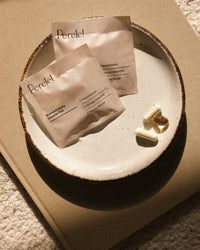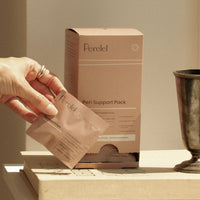Pantothenic acid may sound like an obscure ingredient, but you’re probably already familiar with this essential nutrient: It’s the scientific name for vitamin B5.
Vitamin B5 can be found in most foods, and it plays a vital role in keeping you healthy. Get to know this micronutrient and why it’s even more important when you’re pregnant or nursing.
What is pantothenic acid?
Pantothenic acid is one of the eight B complex vitamins. These vitamins are vital nutrients that play an important role in metabolism and red blood cell formation.1
Pantothenic acid, in particular, helps your body convert carbohydrates, protein, and fatty acids into fuel. It’s also involved in the synthesis of cholesterol, steroid hormones, hemoglobin, and the neurotransmitter acetylcholine.2
Benefits of Pantothenic Acid:
-
Metabolism
Pantothenic acid is necessary for the synthesis of coenzyme A (CoA) and acyl carrier protein.
Acyl carrier protein helps to synthesize fatty acids, while coenzyme A plays “an active role in turning both fatty acids and carbohydrates into fuel for our bodies,” says Gabby Kane, MS, RDN, CSP, LD.
-
Heart health
Because pantothenic acid helps the body metabolize fats, researchers have studied its potential benefits for maintaining healthy cholesterol levels.3
Pantothenic acid may also have an antioxidant effect that helps to protect against low-grade inflammation, which is associated with early-stage heart disease.4
However, more research is still needed to determine if and how pantothenic acid may support heart health.
-
Skin health
When used as a topical ingredient, vitamin B5 may offer potential benefits for skin care.
Panthenol, a precursor to pantothenic acid, is commonly found in moisturizing skin care products. Research suggests panthenol-based formulas may also help to maintain or improve skin integrity.5
Another form of pantothenic acid, dexpanthenol, may potentially be used as a treatment for certain skin conditions.6
“Pantothenic acid — vitamin B5 — acts as a hydrator by attracting water to the skin,” says Robin Evans, MD, a board-certified dermatologist at Southern Connecticut Dermatology. “Pantothenic acid also has anti-inflammatory properties, so it can help with inflammatory skin conditions.”
All skin types may benefit from this ingredient, Evans adds, though drier skin types may benefit the most from its moisturizing properties.
Why do pregnant women need more pantothenic acid?
The recommended daily amount (RDA) of pantothenic acid for adults ages 19 and older is 5 mg per day. The RDA increases to 6 mg for pregnant women and 7 mg for breastfeeding women.
Pantothenic acid isn’t the only B vitamin that takes on extra importance when you’re expecting. Folate, another B vitamin, is one of the most vital nutrients for pregnant women.
“Like most B vitamins, more is needed during pregnancy and breastfeeding to account for the added strain on the body,” Kane explains.
“During pregnancy and while breastfeeding, the baby needs a lot of nutrients to grow,” she adds. “If the mother doesn't have enough of a certain nutrient in her diet—from food or supplements—the baby's nutrition is prioritized. That means pulling from mom’s body stores, which can leave her potentially deficient.”
To make sure you’re getting enough of this vitamin to support you and your baby’s health, look for a multivitamin for pregnancy that includes pantothenic acid.

What foods have pantothenic acid?
Pantothenic acid can be found in almost every food, including meats, veggies, nuts, beans, and dairy products. In fact, its name is derived from the Greek word pantothen, which means “from everywhere.”7
“The best way to make sure you get enough pantothenic acid is to have a balanced diet,” Kane says.
So what are some of the best pantothenic acid foods?
Many grain-based products such as cereals are fortified with pantothenic acid, Kane says. A serving of fortified cereal typically provides 5 mg of pantothenic acid, or 100 percent of the daily value for most adults.8
Other top sources of pantothenic acid include:
- Beef liver (8.3 mg per serving)
- Shiitake mushrooms (2.6 mg per serving)
- Sunflower seeds (2.4 mg per serving)
- Chicken breast (1.3 mg per serving)
- Bluefin tuna (1.2 mg per serving)
- Avocados (1 mg per half avocado)
Do you need to supplement with pantothenic acid?
Because pantothenic acid is present in most foods, a vitamin B5 deficiency is rare. As long as you typically eat a well-rounded diet with plenty of nutrient-dense foods, you’re most likely getting an adequate amount of vitamin B5.
However, pantothenic acid is a water-soluble vitamin, and water-soluble vitamins aren’t stored in the body.9 That means any excess that your body doesn’t use will be eliminated through urine.
So it’s important to make sure you’re getting the recommended intake every day—especially if you’re pregnant or breastfeeding. Taking a supplement that includes pantothenic acid can help to fill in any gaps in your diet and ensure you hit the RDA.
Pantothenic acid may be included as part of a B-complex supplement or daily multivitamin. You’ll find it in the Women’s Daily Vitamin Trio in the form of d-calcium pantothenate.
And because pantothenic acid is particularly important for the heath of pregnant and breastfeeding women, you’ll also find it in the Prenatal Pack for every trimester, along with the Conception Support Pack and Mom Multi Support Pack.
What happens if you don’t get enough pantothenic acid? The symptoms of a vitamin B5 deficiency10 may include:
- Headache
- Fatigue
- Irritability
- Restlessness
- Sleep issues
- GI symptoms
loss of appetite - Numbness or burning in the hands or feet
But a vitamin B5 deficiency typically only happens in cases of severe malnutrition, which means someone with a vitamin B5 deficiency is likely to be lacking in other key nutrients too. Experts note that this can make it difficult to pinpoint whether certain side effects are caused by a vitamin B5 deficiency or by another deficiency.11
Of course, since pantothenic acid is prevalent, you may also be wondering if it’s possible to get too much pantothenic acid. Some people may experience mild diarrhea or gastrointestinal issues when taking high doses. But even at 10,000 mg per day—which is more than 1,600 times the RDA—no pantothenic acid toxicity has been reported.12
So even if you’re getting plenty of pantothenic acid in your diet, you may want to consider taking a supplement, especially one that provides other essential vitamins that work alongside pantothenic acid to help you stay healthy.
Ready to boost your nutrition? Shop doctor-made vitamins targeted to your exact stage of womanhood now to kick off a healthy habit.
This article is for informational purposes only. It is not, nor is it intended to be, a substitute for professional medical advice, diagnosis, or treatment and we recommend that you always consult with your healthcare provider. To the extent that this article features the advice of physicians or medical practitioners, the views expressed are the views of the cited expert and do not necessarily represent the views of Perelel.
1 National Library of Medicine; Medline Plus: B Vitamins
2 Harvard Medical School; Harvard Health Publishing; Listing of vitamins; August 2020
3 National Institutes of Health; Pantothenic Acid: Fact Sheet for Health Professionals
4 Harvard TH Chan School of Public Health; The Nutrition Source: Pantothenic Acid — Vitamin B5
6 Terrence Sanvictores and Shaylika Chauhan; Vitamin B5 (Pantothenic Acid); Aug 2021
7 National Library of Medicine; Pantothenate and CoA Biosynthesis; Nov 2021
8 National Institutes of Health; Pantothenic Acid: Fact Sheet for Health Professionals
9 J Clifford and J Curely; Water-Soluble Vitamins: B-Complex and Vitamin C; Dec 2019
10 National Institutes of Health; Pantothenic Acid: Fact Sheet for Health Professionals
11 Terrence Sanvictores and Shaylika Chauhan; Vitamin B5 (Pantothenic Acid); Aug 2021
12 National Institutes of Health; Pantothenic Acid: Fact Sheet for Health Professionals



















